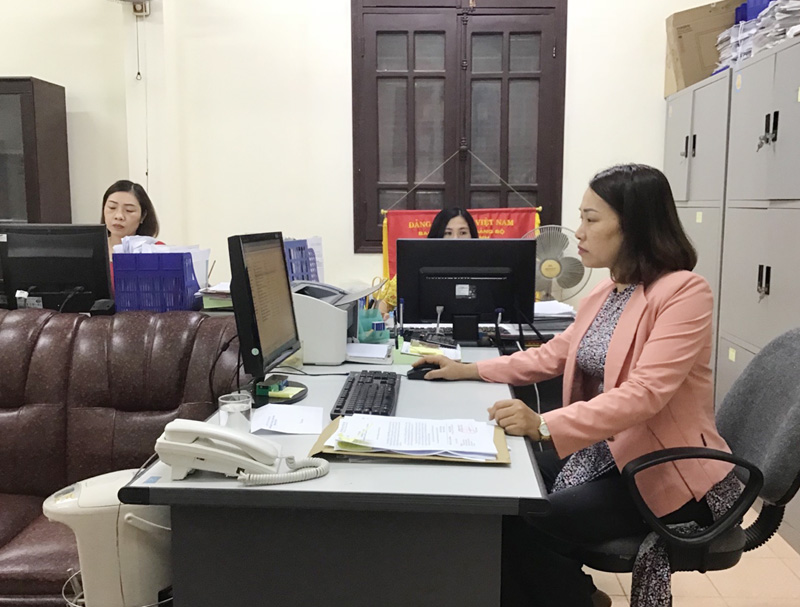
(HBO) - Hoa Binh has for years implemented the 11th Politburo’s Resolution 36-NQ/TW, dated 1/7/2014, and Plan No. 121-KH/TW of the standing board of the provincial Party Committee on promoting IT application and development to meet requirements of sustainable development and international integration. As a result, the awareness on the matter among local authorities at all levels and public personnel has been improved remarkably.
 Officials and civil
servants of the Party Committee of Cao Phong district paid attention to applying
IT to improve professional performance.
Officials and civil
servants of the Party Committee of Cao Phong district paid attention to applying
IT to improve professional performance.
In order to institutionalise and put the resolution into
practice, in 5 years (2014 – 2018), Hoa Binh had issued one agreement, 17
decisions and five plans on cooperation in terms of IT application across
fields, particularly in administrative reform. In addition, the province paid
attention to completing, supplementing and guiding the implementation of administrative
processes, standards and regulations. Designing evaluation criteria system and financial
and investment mechanisms for the work was also important.
According to the provincial Party Committee’s standing board,
to realise the goal of making three strategic breakthroughs, Hoa Binh has been
focused on using IT application to boost administrative reform; building an e-governance
system and providing online public services. To date, e-office software has
been used in People’s Committees, departments and agencies from provincial to
communal levels. The system has been linked to the National E-Document Exchange
Platform, allowing the exchange of documents online through four levels,
contributing to bettering management, improving working efficiency, saving
time and cutting paper costs.
The electronic single-window software, installed at the
provincial Public Service Center since August 2017, has so far connected all of
the local departments and sectors. Hoa Binh has mobilised funds from many
sources to build IT technical infrastructure and train human resources, among
others.
Such efforts have helped local cadres and public workers make
use of the advantages and minimise negative impacts brought about by the 4th
Industrial Revolution./.
Hoa Binh province is undergoing a dynamic transformation amid Vietnam’s national digital transition. Building on Poliburo’s Resolution No. 57-NQ/TW on breakthroughs in science, technology, innovation, and national digital transformation, the province has rolled out a wide range of practical action plans. A standout initiative is the "Digital Literacy for All” movement, an effort to ensure that no one is left behind in the digital era.
Hoa Binh province is undergoing a dynamic transformation in the wake of the national digital transformation movement. Building on Resolution No. 57-NQ/TW of the Politburo on breakthroughs in science, technology, innovation, and national digital transformation, the province has implemented a wide range of practical action plans. A standout initiative is the "Digital Literacy for All” movement ambitious effort to ensure that no one is left behind in the digital age.
With a spirit of unity and proactive problem-solving, the Party Committee, the government and the people of Dong Lai Commune (Tan Lac District) have made great strides in implementing the resolutions of the 24th Party Congress of the commune for the 2020 - 2025 term. Focusing on leadership and practical actions, the commune has brought the Party’s resolutions into daily life, creating strong impacts and pushing the local development forward.
Amid the nationwide push for digital transformation, young people in Hoa Binh Province are stepping up as dynamic pioneers, applying technology to enhance Youth Union operations and expand the reach of youth-led initiatives. Through creativity and adaptability, Youth Union organizations at all levels have introduced a series of practical solutions, contributing to modern governance and community development.
In recent years, An Nghia commune, located in Lac Son district, has stepped up administrative reform, focusing on improving the quality and efficiency of its single-window service unit for receiving and processing administrative procedures. These improvements have helped create favourable conditions for local residents and organisations to handle administrative procedures, contributing to the commune’s broader socio-economic development.
The Prime Minister-approved master plan to develop the multi-use value of forests ecosystems through 2030, with a vision to 2050, aims to improve the management and sustainable use of forest resources, create jobs, increase incomes, and improve the living standards of ethnic minorities, people in mountainous and remote areas, forest workers and those living near forests.



 Officials and civil
servants of the Party Committee of Cao Phong district paid attention to applying
IT to improve professional performance.
Officials and civil
servants of the Party Committee of Cao Phong district paid attention to applying
IT to improve professional performance.